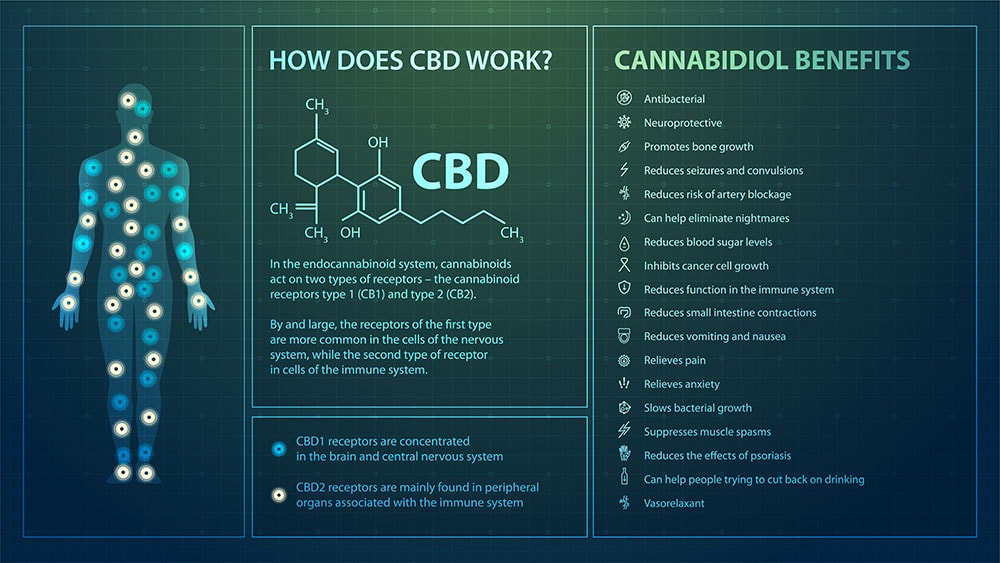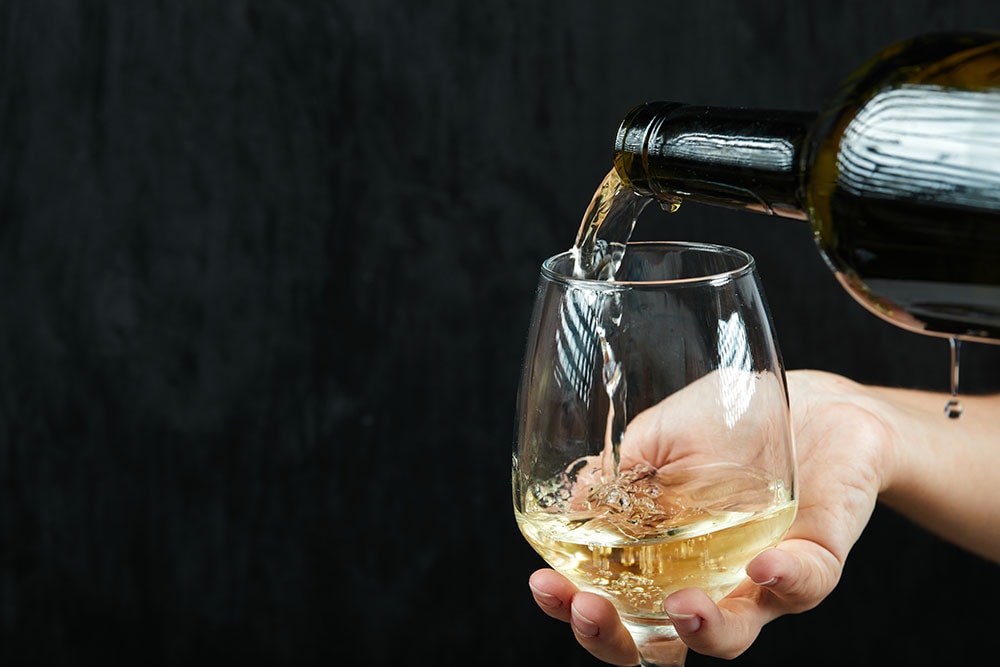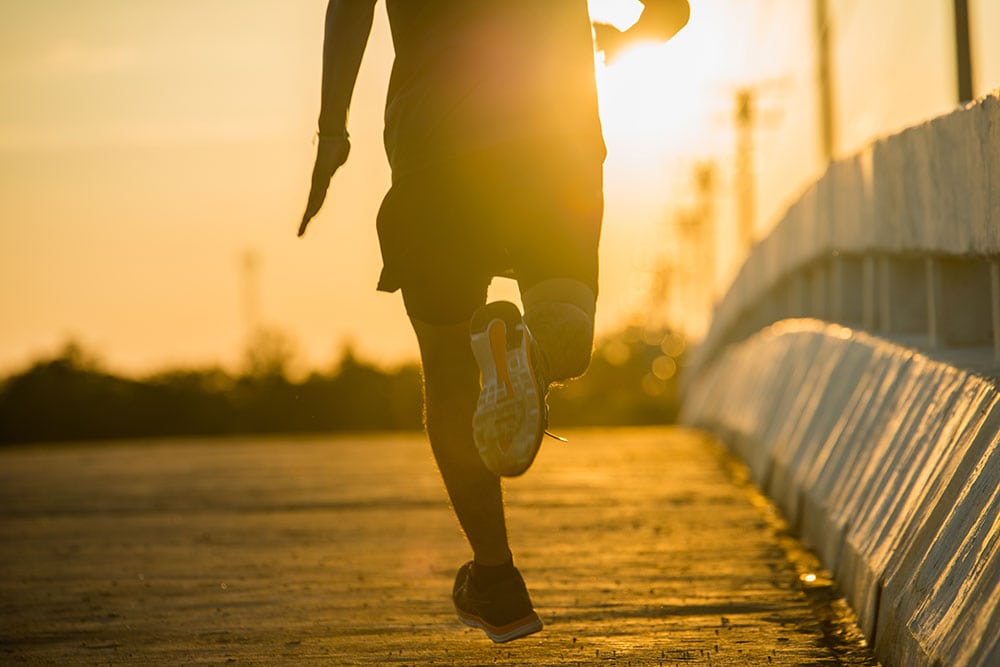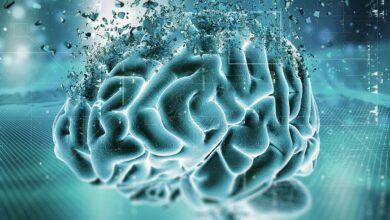It is no secret that there is a mental health crisis in Europe. It is estimated that one in four people will suffer from a mental health problem at some point in their life.
A recent study showed that the chance of somebody developing an anxiety disorder is close to 7%, and this is frequently accompanied by other conditions such as depression.
Pharmaceutical drugs can be effective, but can cause many unpleasant and unwanted side effects, such as blurry vision, confusion, upset stomach and problems with balance, coordination and speech. They’re not for everybody.
CBD can be a great way to help control and reduce your symptoms, but it’s important that you know what you’re doing before using it. We’ve put together this blog post with all the information you need on how CBD works and what effects it has on anxiety-related disorders.
What is CBD?
Cannabidiol, or CBD for short, is an essential chemical compound from the Cannabis Sativa plant. Along with CBD and THC, scientists have identified over 540 active ingredients called cannabinoids, flavonoids and terpenes.
THC is the cannabinoid that produces the “high” feeling that people associate with weed or marijuana.CBD does not induce this high, instead it offers a variety of potential health benefits.
It is a non addictive, natural substance that can be extracted from hemp and marijuana plants. CBD has many therapeutic qualities, but in this article we’re going to concentrate on its ability to reduce anxiety symptoms.
How CBD works in our bodies
CBD interacts with receptors in your body that affect mood, stress levels and pain. This can help to reduce anxiety symptoms because CBD is able to bind to the same places as anandamide, a cannabinoid which reduces feelings of fear and contributes to relaxation.
In other words: when you use CBD it helps your brain and body to naturally reduce anxiety symptoms.
Opinions vary as to how long you need to take CBD before it works; however, for some people, their anxiety lessens after just one day. It’s important to remember that everyone is different, so what works for one person may not work as well for another.

What is the endocannabinoid system?
The endocannabinoid system is a complex system that is made up of an intricate network of cell receptors, all relating to the central nervous system (CNS) and immune systems.
It plays a significant role in how we experience pain, whether acute or chronic, as well as regulating immune response, sleep, hormones, fertility, body temperature and stress management among other things.
The endocannabinoid system has three main components:
- Cannabinoid receptors CB1 and CB2 on the surface of cells
- Endocannabinoids, minute molecules that activate cannabinoid receptors
- Metabolic enzymes that break down the endocannabinoids after use.
The endocannabinoid receptors located on the cells wait to receive messages from our body’s chemical compounds – our endocannabinoids – about an imbalance in our body.
When these are received they trigger the release of chemicals to redress that imbalance, adjusting our mood, appetite and memory; and reducing pain response.
When the endocannabinoids have performed their function they are broken down by our metabolic enzymes.
Common types of anxiety disorders
There are five major types of anxiety disorder: generalized anxiety disorder (GAD), panic disorder, obsessive-compulsive disorder (OCD), post-traumatic stress disorder (PDSD), and social anxiety (SAD).
Generalized Anxiety Disorder: GAD symptoms include excessive worrying about events or activities when there is no good reason to be concerned; feeling restless or on edge; difficulty concentrating, and irritability.
Social Anxiety Disorder: SAD, also known as social phobia, is characterized by abnormal anxiety in social situations and fear of being judged or scrutinized.
Panic Disorder: is characterized by unexpected attacks of intense fear accompanied by physical manifestations such as rapid heartbeat (palpitations), chest pain, shortness of breath (dyspnea), a choking sensation (pyrexia), and sweating that lasts from several minutes up to an hour.
Obsessive-Compulsive Disorder: OCD is an anxiety disorder characterized by obsessive thoughts or behaviors, such as repetitive hand washing.
Post-traumatic Stress Syndrome: PTSD is a mental disorder triggered by witnessing an event in which there was death, or experiencing a deeply traumatic event.
What causes anxiety?
Anxiety disorders are hard to understand. They have many different causes, but are basically the body’s flight or fight mechanism firing too easily.
There are a lot of factors involved, including:
- Genetics
If you have a family member who has an anxiety disorder, you might also have one.
- Changes in Brain Structure
Suffering from traumatic events or genetic changes can change the structure of your brain and make you more prone to anxiety.
- Environmental Factors
Certain aspects of your environment can worsen anxiety. Chronic stress at work, school, or home may lead to this condition. Sometimes, stressors like a bad financial situation or the loss of someone close to you also contribute.
When you don’t sleep enough, it may make your anxiety get worse.
- Medical Conditions
Those who suffer from anxiety live in constant fear of disaster, which in turn negatively affects physical health. Diseases such as cancer, Alzheimer’s, Parkinson’s disease, and HIV can also be linked to excessive episodes of anxiety, with the disease causing anxiety which in turn makes the symptoms worse.
How CBD oil can help
CBD is thought to help reduce anxiety by helping the body to process serotonin, the hormone that helps regulate emotions, similar to the SSRI class of medication.
It has a soporific effect and can reduce anxiety-related sleep issues, aiding in both the process of falling asleep, and improving sleep quality.
CBD can also help stimulate the hippocampus and improve its functioning. The hippocampus is the area of the brain that regenerates neurons, and often appears to function poorly in patients diagnosed with anxiety.

The effects of alcohol on anxiety
When you’re feeling stressed or nervous, or having a difficult day, it can be tempting to have a beer or a glass of wine to calm your nerves.
It’s true that short term alcohol can help take your mind off your troubles. It is a sedative, it can boost your mood, make you more sociable and help you relax.
However, heavy drinking over time can cause anxiety and make it worse.
Alcohol changes levels of serotonin and other neurotransmitters in the brain, increasing serotonin whilst you are drinking, but causing it to drop afterwards leading to even more anxiety the next day.
It’s common for people with social anxiety disorder to drink alcohol to cope with social interactions. Whilst this works short term, long term it can lead to alcohol dependance, which can make anxiety symptoms worse.
It is estimated that about 20 percent of people with social anxiety disorder also suffer from alcohol dependence.
CBD can help with this. Many people have found that smoking or vaping CBD can give the same instant stress release as drinking alcohol because CBD taken by this method enters the bloodstream very quickly through the lungs.
The advantage is that the CBD does not deplete serotonin levels meaning there is no subsequent crash the next day.
Taking CBD oil is a slower approach, it takes more time for the CBD to enter your bloodstream this way, but taken regularly 3 times a day, it can stop the feelings of stress and anxiety reaching the point where drinking alcohol seems like the only solution.
Possible side effects of CBD oil
Cannabidiol is generally considered safe and poses no threat of addiction, according to the World Health Organization.
The side effects of CBD oil are mild and include:
- A dry mouth
- Temporary drop in blood pressure
- Dizziness
- Sedation (in high doses)
- Diarrhea (from large amounts of oil)
CBD is an excellent option for those suffering from anxiety disorders, but some precautions are sensible. The industry is not well regulated so do your research and be careful to buy from a trustworthy source.
In what is known as the “grapefruit effect”, it can also interact with a very small group of prescription drugs – just like grapefruit. It has anticoagulant effects that can thin blood and it can also lower blood pressure.
CBD isn’t a replacement for prescription medications. If you take any medication, continue to take it as prescribed by your doctor until advised otherwise.
Scientific evidence for using CBD to treat anxiety
A multitude of studies have been conducted on the use of cannabidiol as a potential treatment for anxiety disorders. Here are a small selection:
Cannabis for anxiety and depression
A study on cannabis published in the Journal of Affective Disorders suggested that by inhaling the substance, short-term levels of anxiety and depression could be markedly reduced.
Their research indicated that one puff of cannabis with low THC and high CBD levels was the best choice for reducing depression; two puffs of any cannabis was sufficient for anxiety relief, while 10 or more puffs of cannabis high in CBD and high in THC produced the greatest reduction in general stress.
Pain, depression and mental health issues in New Zealand
In a recent 2020 study conducted in New Zealand, 397 adults were evaluated for the effects of CBD. The participants had been receiving medical marijuana prescriptions for a variety of complaints including cancer-related symptoms, mental health issues, neurological symptoms and non-cancer pain.
Incredibly, every single group experienced improvements in their quality of life after 3 weeks of treatment.
Amongst those receiving CBD treatment for anxiety or depression, improvements in ability to perform daily functions and reduced pain and anxiety or depression symptoms were reported.
70% of those taking part in the trial reported satisfaction with the treatment, with just 9.9% reporting minor side effects such as vivid dreams and sedation.
PTSD in Brazil
A Brazilian study showed CBD to be a potentially effective treatment for post-traumatic stress disorder (PTSD) by preventing recurring nightmares and replaying negative memories, potentially improving outcomes for people coping with traditional treatments like medication or cognitive behavioral therapy.
Severe anxiety issues
In a 2018 study, researchers found that men who took a dose of CBD (300 mg) 90 minutes before a simulated public speaking test were significantly less anxious. They concluded that oral doses of 300 mg or more are enough to help people with severe anxiety issues in the short term.
You can check out more studies on CBD and cannabis for anxiety here
How to use CBD for anxiety
Here are some tips to make taking CBD oils a little bit easier:
1. Talk to your doctor or medical professional
When it comes to CBD for anxiety, it’s not one-size-fits-all. You want to make sure that you are getting the correct dose of CBD and adjusting according to your needs so you can find what works best for you!
The first step is talking with your doctor or other advisor about whether CBD might be a good option for treating any symptoms related to an anxiety disorder. Next, they will likely recommend how much CBD should work based on their research and conversation with you.
2. Choose your CBD dose.
The most common questions we hear about CBD are what to use and how much of the product should be taken. When using CBD for anxiety, start by taking a small dose until you know how your body reacts to the effects.
Your body will not react the same to every product – we recommend trying a few different products to find what works for you. The best CBD oil is made from organic, natural hemp plants that contain all of their original compounds and terpenes intact.
3. Take CBD
When using CBD oil for anxiety, we recommend taking it sublingually (under the tongue), which allows you to absorb it into your system in a matter of minutes. Our favorite way is with a dropper or atomizer. Both enable quick release under the tongue.
Oil doses will vary depending on person size, but as a general guideline, it is best to start low and build up, taking a couple of drops of full-spectrum CBD three times a day: in the morning with breakfast, at lunch time, then before going to bed.
CBD taken this way should stay in your system for about eight hours, giving you 24 hours of relief. If you are suffering from sleeping issues, you could take an extra drop with your nighttime to ease sleep.
4. Establish a routine to help manage anxiety
Anxiety can severely impact your physical and emotional, and social well-being. Developing a routine, especially one with healthy habits like exercise and meditation or yoga can help you manage anxiety symptoms.
The benefits of exercise for those suffering with anxiety and other mental health issues are well documented, and it is generally recommended that all adults should do a minimum of 30 minutes exercise five times a week to maintain good physical and mental health.

How much CBD should you take to treat anxiety?
The amount of CBD you should take to treat your symptoms will depend on a few factors, including:
- body weight
- the condition you’re treating
- your individual body chemistry
- Your age and general state of health
- Other medications you may be taking
- the concentration of CBD in the oil you have chosen.
In other words, there are a lot of variables to consider, so it is a good idea to speak to an expert who can advise you on dosage based on the information you give them.
How to calculate dosage
Some products, such as CBD gummies, capsules, or pills, come with a built-in system for measuring the dosage in milligrams. But if you’re using CBD oil, it can be harder to know how much concentration of mg is present in each drop or dropperful.
To work it out, divide the total mg of CBD in the bottle (for example 500mg) by the size of the bottle (for example 10ml)
500 divided by 10 = 50. This means that 1ml of the oil contains 50mg of CBD.
If the bottle has a pipette, it should be marked with a milligram scale.
Alternatively, if it is a dropper bottle, the bottle should state how many drops it contains. In this case divide the total mg of CBD (for example 500mg) by the amount of drops in the bottle (500)
500mg divided by 500 drops means that each drop contains 1 mg of CBD
Likewise an atomizer bottle should state the amount of squirts per bottle. Divide the total amount of mg per bottle by the amount of squirts to give you the mg dosage per squirt.
There’s no way to know whether a CBD dose is the right one without experimenting with it and seeing how your body reacts (since we all metabolize CBD differently). But if you’re looking to start small, try just 0.1 mg three times a day.
What should I look out for?
People often forget when they start experimenting with CBD products that the THC contained in full spectrum oil can affect anxiety levels as well. Check the label of the bottle well. If you are particularly sensitive to THC you might want a broad spectrum oil (containing no THC) rather than a full spectrum one (containing less than 0.3% THC).
What to consider when choosing CBD oil for treating anxiety
- Think about the delivery method. Do you want an oil to take sublingually, capsules or edibles to swallow; or flowers to vape or smoke?
- Do you want a full spectrum product with up to 0.3% THC; a broad spectrum one with no THC, or a CBD isolate with only CBD.
- Check that this product is made by a company that offers third-party testing from an ISO 17025-compliant lab.
- Check that a full spectrum CBD contains no more than 0.3% THC.
- Check strength and dosage.
Final thoughts: Is CBD Oil recommended for treating anxiety?
If you’re looking to get off prescription medications with unpleasant side effects or something addictive – then we highly recommend giving this natural remedy a try.
CBD has been shown to help reduce symptoms for people who suffer from chronic forms of anxiety, without causing adverse reactions such as addiction, as there is nothing in cannabis that can create dependency. This all-natural opiate alternative also offers many other benefits, including relief from pain and inflammation similar to ibuprofen.
We hope this post has helped you learn how CBD can help alleviate your anxiety symptoms without any risks of addiction or adverse reactions! Share it if you think someone else would benefit from reading. 🙂

READ MORE
Full spectrum CBD: what is it, and how can it help?







